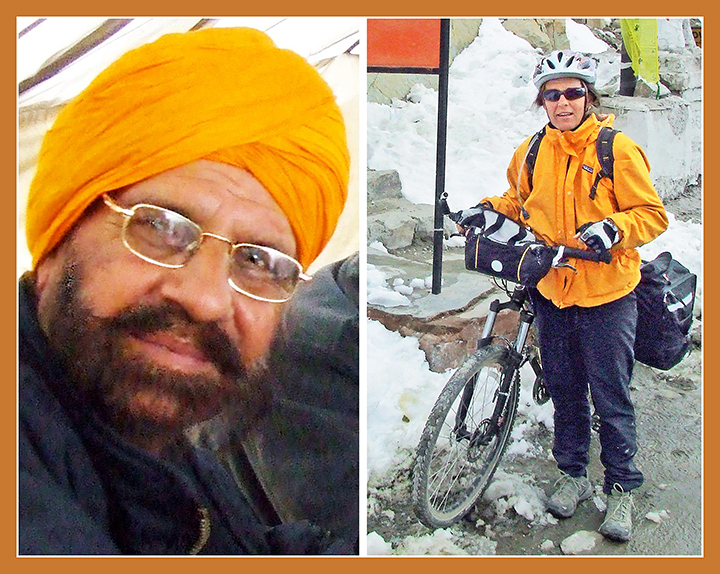
Cochranite rides on dharma’s coattailsCOFFEE WITH WARREN, with Warren Harbeck |

|
Mr. Singh rescued Cochrane cyclist Robyn MacKay in Indian Himalayan snowstorm. Photos by Robyn MacKay Cochrane’s cycling goodwill ambassador Robyn MacKay responded to my Nov. 22 column’s reference to the Parable of the Good Samaritan with a dharma experience she had in 2008 while riding through the Himalayan foothills. She writes: INDIA – the only country in the world where I can still feel confident about finding my way on a solo bike trip over the highest motorable road in the world, when I’ve forgotten my map on the kitchen counter in Canada. I arrived in the Indian Himalayas to cycle the road from Manali to Leh in September. I had to be completely self-sufficient. The average elevation on the road is 13,000 feet, and the highest pass I crossed was 18,370 feet, giving a new meaning to the word “highway.” Only a sprinkling of buses, jeeps, transport trucks, motor cycles, army vehicles and the odd cyclist venture across the high passes of Ladakh. The majority of the peoples of the Himalayas are nomadic herders and farmers. Buddhist by faith, with the minority being Hindu and Muslim, they emigrated here from Tibet, Nepal, Kashmir and much of Mongolia. The harsh environment they live in creates a committed fellowship where every member contributes to the wellbeing of others. A code of conduct has planted the seeds of humanity enabling every human, plant and animal to survive and thrive – a “Oneness.” I became the grateful recipient of that all-inclusive culture on my journey as I was climbing one of the six passes I had to cross. I’d set out to ride the final 4,000 feet to the top of the 16,040 ft. Baralacha La Pass. In true Himalayan style, a storm blew in so fast there was no time to turn around before the snow was calf-deep. My only safe option was to walk – not ride – my bike back down the mountain. I heard the grinding of a large truck coming up the road. I squeezed myself up against the cliff so the driver of the fuel tanker could get by me safely. He pulled up, carefully stopping so the truck tires didn’t slide, and rolled down his window. Mr. Singh, a Sikh from the Punjab sporting his bright orange turban that perfectly matched my Patagonia jacket, poked his head out of the window. With unwavering authority and in his lilting British accent he declared, “Get in Madame; it is NOT safe on the road for you!” My plan was instantly changed. Mr. Singh asked, “How many of you are there?” When I said, “Only one,” his deep chocolate eyes locked directly on mine. “Then Madame,” he replied, “it is my duty to keep you safe.” Darkness had fallen when we arrived at a nomadic yurt, a circular collapsible tent, in the Ladakh valley. As I pulled back the canvas door and walked into the sweaty, humid dim light, the eyes of a half-dozen other truck drivers seeking shelter turned to stare in disbelief. Bile from my stomach lurched into my throat. Sensing my uneasiness, Mr. Singh reached gently towards my hand and whispered, “Madam, you are safe with me.” My guardian fulfilled his duty and gave me food, shelter and safety through the teachings of Sikhism. I cycled away in the morning to the realization that I had become a partner with Mr. Singh and the other truckers in an unforgettable simple act of humanity. They’d followed their inner moral compass, dharma, to care for me. The lesson for me as I rode on the coattails of dharma is that honouring our duty to others creates a steadfast companion in the darkest of hours, and makes the world a better place. THANK YOU, Robyn. For further reading, Robyn and I recommend Payam Akhavan’s CBC Massey Lectures, In Search of a Better World: A Human Rights Odyssey. © 2018 Warren Harbeck |